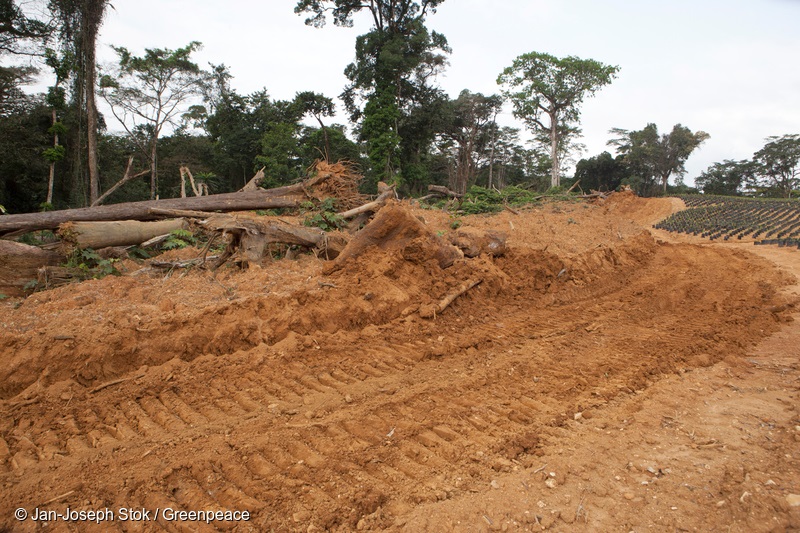Greenpeace analysis of the FLEGT evaluation
Illegal logging and related trade remain persistent global problems despite the positive impacts of EU actions undertaken since 2004. A recent independent evaluation assesses the progress of EU action in tackling illegal logging since the launch of the EU action plan on Forest Law Enforcement, Governance and Trade (FLEGT), more than ten years ago.
Greenpeace welcomes the findings of the evaluators, who urge the EU to continue high level political commitment to FLEGT, to sustain its fight against illegal logging and to undertake more far-reaching actions, in particular to stop deforestation and forest conversion for agriculture.
Sébastien Risso, Greenpeace EU forest policy director, said: “Fighting forest crimes requires persistent action, resources and political determination. Europe must shift gear to end illegal logging and close all entry points for illegal timber to its own internal market.
Aside from banishing illegal logging, Europe must fulfil its commitment to protect forests and put in place legislation to eliminate deforestation from its supply chains and investments, tackling for instance the massive impact of palm oil and soy production on the world’s forests. There really is no excuse for the continued merciless plundering of forest resources and related dramatic impact on the environment and local communities”.
In some countries, almost 90 per cent of timber production is estimated to be illegal according to recent research. Shiploads of illegal timber routinely reach the international market, and may end up in the hands of European consumers, according to a new Greenpeace investigation.
In addition, large volumes of agricultural products linked to deforestation are sold on the EU market each day as food, animal feed and cosmetics. Moreover, European banks and financial institutions often finance business operations, like the conversion of forest for palm oil or pulpwood plantations, contributing to forest loss.
Last year, European leaders committed to halt deforestation and forest degradation by 2020 and to protect and restore forests as a contribution towards limiting global warming to 1.5°Celsius, in the context of the UN sustainable development goals and Paris climate agreement. The EU will only be able to honour these commitments if it secures FLEGT implementation and ensures that the EU’s supply chains and investments are not linked to deforestation and forest degradation.
Next steps and FLEGT review take away
European agriculture ministers are expected to discuss the FLEGT evaluation at the June 2016 agriculture council. The Dutch Council Presidency has already stated that it “will strive for a more effective, coherent approach that will also strengthen efforts to halt deforestation”.
Greenpeace, together with eight other organisations recently presented its call for action, including recommendations, in a briefing note. Many of these are mirrored in the FLEGT evaluation report, which emphasises that the EU must:
- ensure the effective and uniform enforcement of the EU law banning illegal timber;
- step up international dialogue and diplomacy with other major timber consumer countries, notably China, for them to adopt comparable legislation;
- include timber coming from illegal forest conversion within existing FLEGT Voluntary Partnership agreements, and address the issue of conflict timber as this was not adequately dealt with so far;
- pursue with more determination the “higher objectives” of sustainable development, notably environmental sustainability, poverty eradication, and human and labour rights, in the implementation of the FLEGT action plan, including by giving due attention to obligations deriving from international law and agreements;
- combat global deforestation more effectively by taking more far-reaching actions involving all sectors impacting on land use.
In addition, Greenpeace urges the EU to keep the improvement of forest governance at the forefront of EU action in the coming years. Effective forest governance is essential to ensure the long term sustainability of action to combat illegal logging and deforestation. The EU should urgently address “fundamental land-use and governance challenges, including corruption, which is preventing progress in FLEGT/VPA action in several partner countries”,in line withthe evaluators’ assessment. It should also heed the report’s warning thatsome of the forest governance challenges facing countries affected by illegal logging “turn out to be deeply rooted and require sustained action over a long timeframe”.
The evaluation report replicates a number of generic recommendations, such as simplifying compliance procedures and increasing private sector involvement, which play the tune of the industry, but which risk to undermine the integrity and effectiveness of FLEGT systems, and give corporations undue influence over public policy and issues of forest governance.
The evaluation falls short of adequate recommendations on finance and investment. The report’s authors acknowledge that NGO investigations have been the only effective action, other than banks ‘self-regulation’, to address the impact of finance on forests. However, despite noting that “so far, legally binding constraints on them [banks] have not been included in the EU framework”, the authors shy away from proposing a concrete regulatory response. Instead, they merely suggest creating a joint platform with actors from private sector and civil society to monitor investments.
Yet, legislation to shift investment away from forest damaging activities is urgently needed. Self-regulation and other half-hearted solutions have been ineffective.
Contacts:
Sébastien Risso, Greenpeace EU forest policy director, [email protected], T. +32 (0)2 274 19 01. EU transparency register number 9832909575-41.
For breaking news and comment on EU affairs: www.twitter.com/GreenpeaceEU
Greenpeace is an independent global campaigning organisation that acts to change attitudes and behaviour, to protect and conserve the environment and to promote peace. Greenpeace does not accept donations from governments, the EU, businesses or political parties.

